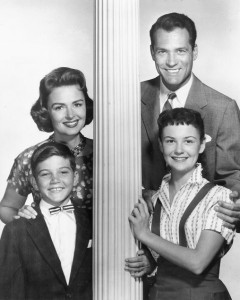In one scene from Annie Hall, Alvy (Woody Allen) finds his argument with Annie (Diane Keaton) cut short by a blowhard who invokes the name and work of Marshall MacLuhan in a harangue he’s delivering to his own date. Fed up, Alvy ducks off-camera and returns with none other than MacLuhan himself in tow.
“I heard what you were saying,” MacLuhan tells the loudmouth. “You know nothing of my work. You mean my whole fallacy is wrong. How you ever got to teach a course in anything is totally amazing.” Facing the camera, Alvy says, “If only life were like this.”
For Catholics, life is, in fact, becoming a little like this. Pope Francis, an authority even less impeachable than MacLuhan, has taken to making house calls. Or rather, he makes phone calls, often to people’s houses. The head of the Society of Jesus, an Argentine rape victim, an Italian single mother-to-be — all have been rung up, unexpectedly, by the Supreme Pontiff himself. When a sales assistant in Toulouse claimed the pope had phoned him to say his homosexuality was “not a problem,” the French paper La Depeche du Midi, and later The Huffington Post, reported the story without bothering to check it with the Vatican. It proved to be a hoax, but even now it sounds plausible — the part about Francis’ medium, if not his message.
For this, the press has dubbed Francis the “cold-call pope,” which, with all due respect to Francis, is nonsense. With the exception of the Jesuit Father-General, whom the pope-elect already knew well, all the objects of his phone ministry initiated contact by writing him. Cold-calling involves dialing a number surreptitiously obtained, with no advance show of interest from its owner. It is the business answer to reconnaissance by fire, and anyone who survives more than 2,000 hours of it deserves to wear a commemorative badge — a headset mounted on an oak wreath, all in silver — on his shirt, right over the polo pony or alligator.
But if Francis does decide that reaching out and touching people uninvited would best serve the Church’s interests, he won’t have to do much in the way of skip-tracing. Thanks to the Internet, increasing numbers of the simple faithful are leading semi-public lives. To Innocent III, we must have looked indistinguishable — a solid wall of collapsed, ulcerated faces under greasy, homespun chaperons. Now, on our Facebook and LinkedIn profiles, in our tweets and Disqus posts, we appear in all our individuality, such as it is.
Chesterton wrote that Francis’ medieval namesake had no interest in seeing the forest because he was too taken with the distinctive beauty of each tree. The Internet can make a mystic out of anyone. Even a dolt with the intuitive powers of a hookworm should be able to guess that people who mark their FB profiles with yearbook-type portraits of themselves differ in some fundamental way from those who install snapshots of their children as their heraldic charges. As long as Francis harnesses this information and the clues it offers strictly for pastoral purposes, the effect on morale would be delightful. Who wouldn’t want a surprise birthday call?
But now that Francis can see us when we’re sleeping and know when we’re awake, it follows that he can also know when we’ve been heterodox or docile. Sound morbid? In an age when the National Security Administration has been harvesting client information from Internet providers, morbidity might count as a sign of sanity. Last year, it was reported that a Minnesota pastor refused to confirm a teenager after spotting a meme promoting marriage equality on his Facebook news feed. Although the pastor later insisted the boy had chosen to forgo confirmation on his own, he admitted that the intelligence he’d gained through Facebook would have made him withhold the sacrament in any event. With the help of Google Analytics, a number of my fellow Patheosi have learned they’ve got a reader in Vatican City. None of them has said so openly, but I’d bet they breathe a little easier knowing Pope-Emeritus Benedict retired to a monastery instead of taking his old job back.
Pope Francis would never violate the principle of subsidiarity by imposing his will in matters below his pay grade, at least not formally. But has shown an instinctive preference for spontaneous and direct action. He’s a swashbuckler, in a peaceful kind of way. It’s not hard to imagine him using the Internet, or information quietly gathered there, in shaping a gesture that, though lacking canon-legal weight, would pack a symbolic wallop:
“Hello, is the Catholic Memes guy? I’ve got some great ideas. They just come to me at the craziest times…”
“Hello, are you the guy who runs _______ blog? FOR THE LAST TIME, I AM NOT GOING TO ELIMINATE THE LATIN MASS. Yes, please, quote me.”
“Oye, clever news analyst? You know nothing of my work. How you ever got a job commenting on anything is totally amazing.”
“Hello, combox terror? I pray you in Jesus’ name, don’t have any more cows.”
Well, I guess we’ll just have to wait and see how this all plays out. It’s a shame we won’t be able to read the one sure sign Pope Francis means to use this new connectedness responsibly. Remember that woman in Argentina who claims Jorge Bergoglio proposed to her in the first bloom of young manhood? Well, if Francis isn’t surfing her Facebook profile at least twice a week, he’s got to be a saint.










